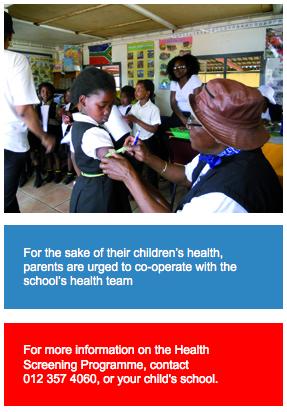Written by Samona Murugan
School Health Screening Programme
Government has pledged to put the health of school children first by rolling out the School Health Screening Programme. The programme brings basic health screening to learners at schools in areas that have been identified as priority health districts. These include schools in areas least likely to have access to health care services. The Department of Health, in partnership with the Department of Basic Education, is currently conducting basic health screening for Grade 1 and foundation phase learners.
 Phase one of the School Health Screening Programme kicked off during School Health Week, in the beginning of March. Phase two will take place in October. The programme will test the eyesight, hearing and basic oral health of learners in Grade 1 and the foundation phase.
Phase one of the School Health Screening Programme kicked off during School Health Week, in the beginning of March. Phase two will take place in October. The programme will test the eyesight, hearing and basic oral health of learners in Grade 1 and the foundation phase.
Seven provinces will be participating in the School Health Week. Health Screenings in the Western Cape have been postponed to a later date due to an outbreak of measles in the province. A mass immunisation programme has been implemented. Screenings in KwaZulu-Natal will take place in August.
Why is health screening important for your child?
- The Health screenings aim to identify and address important health barriers to learning. Identifying health problems early will improve a child’s overall development and assist with his or her ability to learn at school. It will also make parents aware of health problems their children are experiencing and help them to deal with it.
What does health screening involve?
- A team of health professionals led by school health nurses will visit schools. They will check all Grade 1 learners for some of the following: vision, hearing, nutritional status, dental health, physical functioning, speech, immunization status and parasites such as worms.
What role can parents play?
- Parents and guardians can raise awareness in the community about the importance of the School Health Screening Day at their children’s schools.
- Offer help to the principal to assist the school health team on the day of screening.
- Sign and return the consent form to the school giving permission for your child to be checked.
- Inform your child about what will happen on the day and put them at ease.
- Send your child’s original Road to Health Card to the school so that the team can ensure that your child receives the correct immunisation and that it is recorded.
- Accompany your child, if possible, on the day of the screening to provide your child’s medical history and to take note of the findings of the screening.
- If the school health team recommends it, take your child to a clinic or hospital for further assessment and treatment.
- Inform the school of the outcome of further assessments and treatment received at the clinic or hospital.



 Facebook
Facebook Twitter
Twitter WhatsApp
WhatsApp